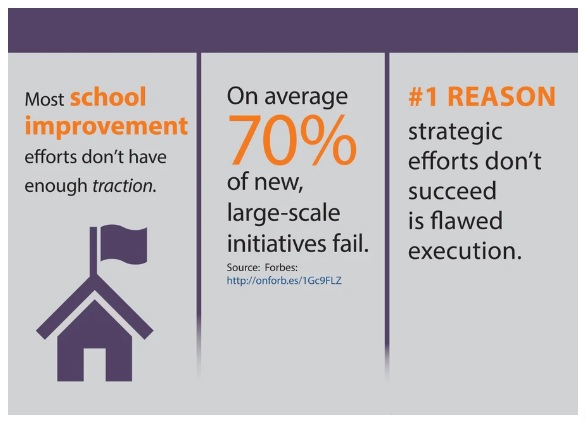School leaders play a crucial role in creating a transformed learning culture, even if teachers are the caring and guiding leaders of the learning process. In today's quickly changing educational world, the need to empower students in their educational journeys becomes evident as a paradigm shift.
The function that schools play goes beyond the conventional methods of instruction; it includes guiding students toward becoming self-directed learners who can take charge of their education. Here are seven levers that may enable your school to reform and aid with time management effortlessly.
Strategies For Epic School Transformation

Here are a few factors that drive a school toward the much needed transformation:
1. Data-Driven Approach
A lecture or session is not the end of the instructional process. Determining the pupils' level of knowledge and filling in any gaps is essential. More efficiently, intuitive data reports and practical actions can assist in achieving the same goal.
School administrators may help instructors create customized study plans and instructions that will enhance student learning, maximize learning outcomes, and improve time management by putting into practice a data-driven strategy. Planning, scheduling, grading, recordkeeping, and other administrative and organizational chores are further streamlined by it.
Do you follow us on Social Media? If not, then you’re missing out on a lot of informative content. We regularly share upgraded educational content, tips, feedback, and more. Check us out by clicking the profiles here - Facebook / Twitter / LinkedIn / Pinterest / Instagram / YouTube
2. Weekly Feedback
For both instructors and students, performance evaluation and constructive criticism are two cornerstones of the educational system. Time-based observations may be the first line of defense. Not too often, not too seldom; it should demonstrate that the administrators have given the evaluation some thought. A weekly 15-minute observation might work well as a plan. It will make it possible for frequent inspection, inspire educators to continue providing high-quality instruction and make it clear that a poor lesson does not equal poor instruction.
The second approach deals with comments. Rather than lecturing on every small detail and providing long feedback reports, school administrators should concentrate on one main area and let instructors work on it as well. It eases the strain and encourages improved growth.
3. Strategic Planning
Lesson preparation takes up a significant portion of the teachers' time. School administrators can expedite the planning process so that plans are developed more quickly. Ensure that the instructors are informed of the precise objectives for every class. Motivate them to pose the crucial query.
Teachers should be encouraged to take charge of their classes while school administrators look for methods to enhance the educational system. Teachers will then begin to cover all the bases to guarantee thorough learning rather than simply teaching.
4. Training And Practicing
The first phase is to build improvement theories and development plans; the second is to put them into practice. It is the responsibility of school administrators to encourage educators to find fresh approaches to teaching and use them in the classroom.
They also need to assess if the new methods are accurately being used and whether the results have a favorable impact on students' learning.
5. Character Building And Ethics
Think about ethos the fundamental ideas, convictions, and standards that ought to guide educators' actions. In the classroom, a teacher's reputation and honesty may foster trust and a productive learning environment.
High moral standards for instructors that are in line with the school's vision and mission must be outlined by the administrators. It will have a big impact on enhancing the educational system, student involvement, and teacher morale.
6. Culture
While professional dedication is vital, a sincere desire to work at a certain organization yields greater achievement. One important issue is professional happiness, which may and will be greatly influenced by the culture of your institution.
Instructors ought to be inspired and driven, rather than feeling forced to show up to class every day and give their all. In general, one's feelings toward the institution are shaped over the initial days or weeks. From the outset, establish a good impression. Demonstrate to educators that your well-being comes first.
7. Systematic Coaching
Teachers should get encouragement and support from their school leaders. School administrators should be involved in every step of the process, from watching the courses to offering comments to create goals and strategies for development.
Recall that this ought to be a continuing conversation. To guarantee upskilling and general growth, there should be consistent and trustworthy contact and discussion between school administrators and instructors.
Lead Schools Towards Better Future
A clear route to quality, equity, and innovation in education is created via the deliberate use of these seven school transformation levers in conjunction with data-driven decision-making. Principals and administrators may create focused interventions to bring about significant change by identifying and ranking these levers by the particular requirements and objectives of their specific schools. Additionally, MA in Education with Leadership and Administration can help administrators learn about their role better and function accordingly.
We believe education should be accessible for everyone. That’s why we don’t charge for our blogs. Find the right course that will help you in your career with us, contact us at - 1800–212–6400. You can mail us at act@asiancollegeofteachers.com









